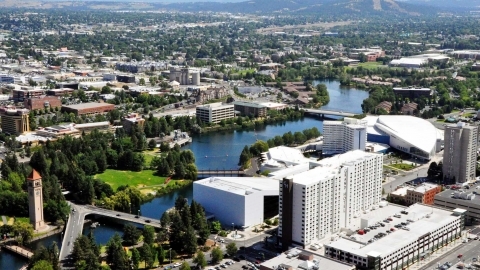Visit Spokane Replaces Membership Dues-Based Model with Community-Benefit Partnership

In a rather bold move amidst a tumultuous year for the tourism industry, Visit Spokane has unveiled a restructuring of its business model that will lead to a short-term reduction in revenue but ultimately open up other avenues of funding and allow the organization to live more fully into its mission of marketing the whole region.
“We found our old model to be antiquated and restrictive,” says Meg Winchester, president and CEO of Visit Spokane. “The hope is that by restructuring the way we do business we will create better partnerships with Spokane’s hospitality community, which will make for a more engaging and marketable business model.”
Visit Spokane laid out its new community-benefit partnership model, which replaces the current one based on membership dues, at its annual meeting on Sept. 24. “We are not a membership marketing organization. We are a destination marketing organization,” says Jamie Rand, chief marketing officer for Visit Spokane. “The only way to be a destination marketing organization is to remove the restrictions that limit our ability to promote our entire destination.”
Scheduled to go into effect on Jan. 1, 2021, the new model eliminates membership dues for restaurants, retail establishments and attractions while simplifying — and in most cases, reducing — dues for hotels and service referral businesses. While the changes were not made as a response to COVID-19 (Visit Spokane has been looking to change their funding model since 2018) the pandemic did expedite the planning and implementation, according to Rand, who says the idea was shopped around to the community before moving forward and received an overwhelmingly positive response.
Visit Spokane expects to lose about $149,000 in annual revenue as it restructures, but Winchester said that they are willing to take the financial hit. “Surrendering revenue from certain categories of membership provides the opportunity to truly serve the mission of Visit Spokane, which is to market the entire region,” said Winchester.
The organization plans to recoup the losses over time by securing strategic partnerships, and rolling out co-op advertising and sponsorship opportunities. Rand says a number of other destination marketing organizations have changed their funding model in similar ways. “And if they haven’t,” says Rand, “they will have to in the future, whether they know it yet or not.”
Don't miss any event-related news: sign up for our weekly e-Newsletter HERE and engage with us on Twitter, Facebook and LinkedIn!


Add new comment